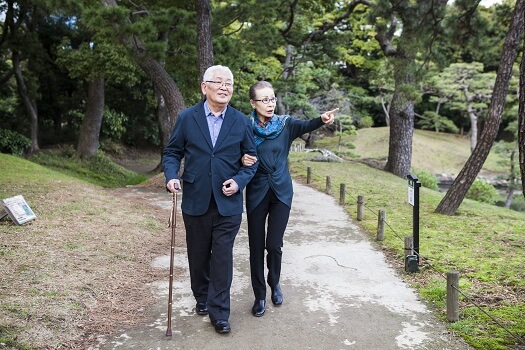Many seniors with dementia become agitated or angry when the sun starts to set, which is a unique symptom known as sundowning. Doctors aren’t exactly sure what causes sundowning, but some experts believe it’s the result of certain chemicals flooding the brain at the end of the day. Here’s a look at five tips caregivers can use to manage sundowner’s syndrome.
1. Regulate the Sleep Schedule
One of the most common symptoms of dementia is insomnia, and a lack of sleep can make sundowning much worse. If your aging loved one isn’t getting enough sleep, try to regulate his or her activities at the end of the day. Your loved one must go to bed at the same time every night even if he or she isn’t tired. He or she might also benefit from a rigid nighttime routine that includes relaxing activities such as listening to music, taking a hot shower, or watching a favorite show for a few minutes.
If your loved one’s sundowning is due to dementia or Alzheimer’s, he or she may need a higher level of care than a family member can provide. Living with a serious health condition can make it challenging for seniors to age in place. However, they can maintain a higher quality of life with the help of professional live-in care. Fair Oaks, CA, seniors can benefit from assistance with meal prep, bathing, transportation to the doctor’s office, medication reminders, and much more.
2. Keep a Journal of Potential Triggers
A wide variety of foods, beverages, and activities can trigger sundowning, and you should try to keep track of all these variables. Some of the most common triggers include caffeine, alcohol, too much excitement at the end of the day, loud noises, and changes to the daily routine. As soon as you identify any potential triggers, you can systematically cut them out of your loved one’s life.
3. Use Natural Light to Your Advantage
Natural light can have a major impact on your loved one’s mental state, and you need to keep an eye out for any unusual lights or color schemes. During the day, you should open up all the curtains and blinds to let the sunlight in. When the sun starts to set, all the curtains and windows need to be closed to prevent shadows. By regulating the light in the home, you’ll also have more control over your loved one’s circadian rhythm and sleep schedule.
4. Encourage Exercise
Most seniors with dementia won’t be able to run laps or head to a gym, but a little bit of exercise can be quite beneficial. Raising the heart rate for just a few minutes every day could have a major impact on your loved one’s demeanor and personality. Completing simple chores, walking around the house, and dancing to classical music are all great options for seniors with dementia. If your loved one hasn’t exercised in quite some time, speak with a physical therapist about coming up with a safe training routine.
Sundowning can be one of the most challenging aspects of aging, particularly for elderly people with dementia or Alzheimer’s disease. Seniors can face a variety of challenges as they age, many of which can be mitigated with the help of professional in-home caregivers who provide high-quality senior home care. Fair Oaks, CA, families trust Home Care Assistance to help their elderly loved ones age in place safely and comfortably. Reach out to us at Home Care Assistance if you need compassionate, professional care for your loved one.
5. Try Distractions
Learning how to effectively distract your loved one is going to be an invaluable skill. Distracting your loved one could ease some of the symptoms and help you avoid confrontations at the end of the day. About an hour before the sun goes down, you might want to have your loved one watch a show, listen to a favorite band, or complete a puzzle. As long as your loved one is absorbed in the activity, he or she most likely won’t become agitated, angry, or confrontational.
It can be challenging for family caregivers to know how to manage their loved ones’ physical and cognitive needs, and professional caregivers can be a valuable resource. Not every senior has the same care needs, which means they don’t all need the same type of home care. Fair Oaks, CA families can rely on Home Care Assistance to provide individualized care plans to meet your elderly loved one’s unique care needs. Our holistic Balanced Care Method was designed to help seniors focus on healthy lifestyle habits such as eating nutritious foods, exercising regularly, and maintaining strong social ties, and our Cognitive Therapeutics Method offers mentally stimulating activities that can stave off cognitive decline and delay the onset of dementia. To learn more about our reliable, compassionate in-home care services, contact us at (916) 485-4663 today.
